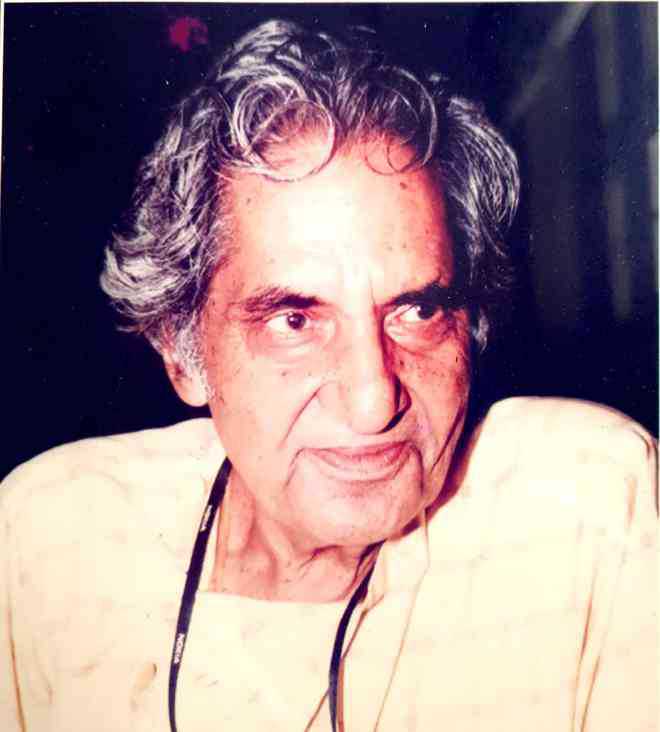
Neeraj
Mrigank Prabhakar
I am alone as I write about my late father, Neeraj. Though my journey with Babuji is of 44 years only, I’m trying to cram a century in his story. It is going to be a little difficult to capture the memories of 90-odd years in 1,000 words. As the world pays tributes to him, his handwritten poems lying on a corner table appear blurred to my teary eyes. With his passing, an era has come to an end. Neeraj had fallen ill many times in the past but would bounce back. And every time he used to murmur with a smile, “Chalta hun abhi chalta hun, ek geet aur gaa lun to chalun.”
I know about his time in Bollywood through my mother’s narrations and conversations with my parents about the film industry. His stay in Mumbai was not a brief stint as some film critics claim. Neeraj spent more than a decade in the film industry, penning down around 120 songs in 40 films. He was nominated the best lyricist for the Filmfare award three times — ‘Kaal ka pahiya ghoome re bhaiya (Chanda aur Bijli, 1970), “Bas yehi apradh main har baar karta hun” (Pehchan, 1971) and “Ae bhai zara dekh ke chalo” (Mera Naam Joker, 1970).
When father went to Bombay in the late 1950s, he was a stage poet. During that time, kavi sammelans were not held frequently and he did not have much money. His poetry resonated with many directors and he was very popular among college students. For them, his verses were a symbol of romanticism.
The Bombay years
Babuji’s film career started in 1964 with Cha Cha Cha and his last film was Chargesheet (2011). Though he ostensibly left Bombay in 1974, the city never left him. Because of his immense popularity and recognition, he became more active and was much sought after in kavi sammelans. His poetic style and experimentation with language in many films of the 1970s became a trendsetter for future lyricists. His expressions like “neeraj naina”, “sapno ki gitanjali” and many more found resonance not only with the public but music directors and filmmakers alike. He worked with many established names like SD Burman, Shankar-Jaikishan, Raj Kapoor, Dev Anand, etc.
There were many reasons why my father found it difficult to continue in the film industry. He never compromised on his style and selection of words for music directors or filmmakers. Many new musicians could not develop a rapport with him. Around that time, SD Burman passed away. There was friction between Shankar and Jaikishan and Raj Kapoor was facing a huge financial crisis after the debacle of Mera Naam Joker. Neeraj’s relationship with them was not just professional but he also enjoyed a personal bonding with them. These circumstances as well as his increasing demand in the kavi sammelan circuit finally forced him to bid adieu to Mumbai.
The later years
After returning from Mumbai, my father devoted his time between Aligarh and Agra as my mother, Dr Manorama Sharma, was working in Agra.
During his years in the film industry, my father had developed a great rapport with many filmstars and other artistes. After leaving the industry, when he and my mother organised a cine night, they invited Meena Kumari, who came gladly. Subsequently, many more such programmes were held. Father would be travelling most of the time to participate in kavi sammelans across the country.
Period of Emergency
In 1975 and the years after that, India was facing a political crisis. Emergency had been imposed. The poet in Neeraj rebelled against the atrocities against people and leaders alike.
While he did not come out openly against the powers that were, he was secretly extending support to anti-Emergency activists. He would deliver letters of a prominent RSS activist, who was imprisoned in Nashik jail, to Mumbai. His popularity soared in the 1980s. In 1983-84, he travelled to the US with Kishan Saroj and was instrumental in popularising Hindi poetry in the West.
Osho Rajneesh was also influenced by Babuji. In 1984, at the Osho commune in Pune, he shared the stage with the spiritual leader. He also asked Neeraj to write the preface of his books. The preface of Osho’s book, Pag Ghungroo Baandh, was written by Babuji.
He had an off-and-on relationship with the Hindi film industry. In 1984, he wrote the title song of Hum Naujawan, directed by Dev Anand and lyrics for Mahesh Bhatt’s Gunaah. In 1999, he gave lyrics to all songs of another Bhatt film, Fareb. He had penned down the songs, along with my brother Shashank while travelling to Mumbai in a taxi. He also wrote for Vijay Anand’s last film, Jaana Na Dil Se Door.
Leisure time
My father was a friend to me and my siblings. He was our guiding force. He would fondly recount his adventures when abducted by dacoit Maan Singh. He also liked exploring new places.
During leisure time, he would play chess or watch cricket matches, news, movies. When he was not travelling to kavi sammelans, he would read newspapers and write or play cards in the evening with some neighbours. However, such leisure days were not many.
Neeraj shared his legacy of poetry and writing with his sons. Very few people know that Neeraj was also a very good astrologer. My father, along with my brother Arastu Prabhakar, composed Neeraj Jyotish Dohavali. Arastu has written many more books on astrology. My brother, Shankhak Prabhakar, has followed my father’s footsteps and is a well-known poet. He has three books to his credit.
During his last days — from Agra to AIIMS, New Delhi, I was with him, where he left for his journey to heaven. He may have gone but the fragrance of his simple words is going to remain forever.



























